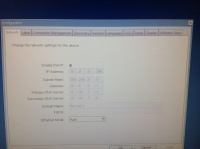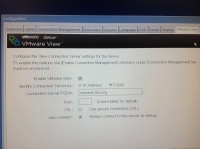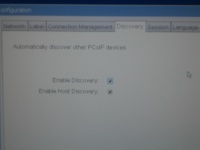Virtual Computing Questions
From Longview ISD Technology Wiki
(Difference between revisions)
| Line 1: | Line 1: | ||
| + | == Samsung Thin Client == | ||
| + | |||
| + | Using a virtual thin client computer is basically the same as using a desktop or laptop computer, but, there are a few differences. | ||
| + | <br> | ||
| + | [[File:SamsungThinClient.jpg|75px|Samsung Thin Client]] | ||
| + | |||
== Samsung Thin Client Network Configuration == | == Samsung Thin Client Network Configuration == | ||
Revision as of 15:29, 9 January 2013
Samsung Thin Client
Using a virtual thin client computer is basically the same as using a desktop or laptop computer, but, there are a few differences.

Samsung Thin Client Network Configuration
Click the word OPTIONS in the upper left corner of the screen.
 Choose CONFIGURATION. Under Configuration a window will come up which will have several tabs across the top.
Choose CONFIGURATION. Under Configuration a window will come up which will have several tabs across the top.
Main tabs to check for configuration: Network Tab, VMWare View Tab, Discovery Tab
Important: if you need to make any changes in the configuration you will need to Reset or Restart the computer. Do whatever it says to do.
- Enable DHCP: Check.
- IP Address: Will vary. Example: 10.8.4.245
- Subnet Mask: 255.255.0.0
- Gateway: Will vary. Example: 10.8.0.1
- Primary DNS Server: 10.40.7.2
- Secondary DNS Server: 10.40.7.6
- Domain Name: lisd.org
- FQDN: blank
- Ethernet Mode: Auto
- Enable VMware View:
- Identity connection Server by: FQDN
- Connection Server FQDN: nemesis.lisd.org
- Port: leave blank
- SSL: no check
- Auto connect: check
- Enable VMware View: Check
- Identity connection Server by: FQDN
- Connection Server FQDN: nemesis.lisd.org
- Port: leave blank
- SSL: no check
- Auto connect: Check



